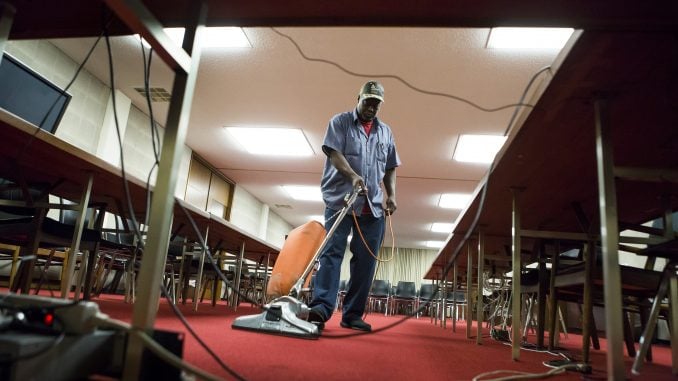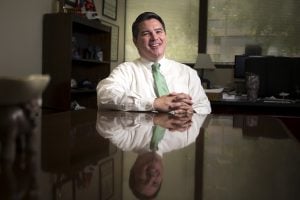
RALEIGH — After a flurry of activity that began with a veto override, lawmakers adjourned their regular legislative session a little after 2am on Friday morning just ahead of the Independence Day holiday and a looming court order on redistricting.
While most of the legislation that moved quickly through committees and floor votes Wednesday and Thursday was introduced and discussed over the course of the six-month session, major tweaks and compromises popped up in the final stretch.
“Thanks to the hard work of the Republican-led General Assembly, North Carolina families can have confidence that they live in one of the best states to build a high quality of life one with sound financial footing, low taxes and record savings that prepare us for emergencies,” said N.C. House Speaker Tim Moore (R-Cleveland) in a press release sent on Friday afternoon.
“I appreciate the hard work of every House member this session, all the legislative staff and each citizen of North Carolina who we are so proud to serve statewide.”
Lawmakers plan to reconvene for a special session on August 3rd, likely to address any vetoes by Gov. Roy Cooper and to handle the redrawing of legislative voting districts.
Among the avalanche of legislation that passed or failed this week, including major business reforms:
Solar vs. Wind: House Bill 589, a whale of a bill more than a year in the making, bounced between drastically different versions in an effort to pass a comprehensive renewable energy package. The original bill, led by Rep. John Szoka (R-Cumberland), hoped to make solar energy more obtainable by creating a program that would allow households and businesses to lease, rather than buy, expensive solar panels for their roofs, while opening up a competitive bidding process for renewable energies that could translate to lower costs for ratepayers.
When the bill hit the Senate, Majority Leader Harry Brown (R-Onslow) added an amendment that would restrict wind energy farms in military fly zones an effort first introduced in 2016 and unpopular with some key House members who felt the map went to far.A compromise was reached around 1am on Friday morning that would see the wind moratorium reduced from Brown’s original bid for four years, down to 18 months. Cooper was supportive of the original House bill, but it is unclear his position on the late-night changes.
Brunch Bill: Senate Bill 155, nicknamed the “Brunch Bill,” is an omnibus ABC bill that loosens restrictions on alcohol sales and consumption.The bipartisan bill, championed by Sen. Rick Gunn (R-Alamance) allows restaurants to serve alcohol before noon on Sundays, and distilleries to sell up to five bottles of their product to customers that come to their taprooms for tastings and tours. The legislation passed the Senate in early June, but was completed with some amendments in the House on Tuesday. Cooper may sign the bill Friday, meaning Sunday morning mimosas could be served as soon as county or city officials approve.
Sunday Hunting: In the final hours of session, lawmakers rushed to pass House Bill 559 a pro-sportsman bill that expands Sunday hunting laws to allow firearm hunting in the morning which is currently banned before 12:30pm. The “Outdoor Heritage Enhanced” law would open hunting beginning at 9:30am, so long as hunters are more than 500 yards away from a place of worship, and permits the hunting of migratory birds such as duck on the Sabbath day for Christians. A county can still restrict hunting, but under the new law they would need to pass a ballot referendum to do so. Outdoorsman say the change will allow more children and individuals who work Monday-Friday to participate and enjoy the heritage sport.
Casino Nights: House Bill 511, headed to the governor’s desk, would allow nonprofits and businesses to serve alcohol at future charity game nights such as bingo and casino nights. An organization would be restricted to hosting no more than two events a month, with cash or cash-value prizes.
Investigation into Sec. Elaine Marshall: House Resolution 925 would establish a joint legislative select committee to investigate allegations that N.C. Secretary of State Elaine Marshall violated state and federal law when she commissioned illegal aliens as notary publics; and therefore, should be impeached from her elected office. The resolution was introduced by Rep. Chris Millis (R-Onslow), who called for Marshall to resign after reports surfaced in September. The bill cleared the House Rules Committee on Wednesday, but was never placed on the floor calendar. It is possible lawmakers will revisit the issue in August.
Campus free speech: Senate Bill 527 instructs the UNC system to implement a curriculum in freshman orientation that teaches students the value of free speech and political tolerance. The bill also enforces disciplinary actions on protesters who “substantially disrupt” free speech on campus. The bill passed both chambers on Wednesday and Thursday, respectively, and sent to the governor.
Appointments: House Bill 256 saw lawmakers tap one of their own, Sen. Andrew Brock (R-Davie), to the State Board of Review after Cooper missed a May 1 deadline to fill the paid position that oversees appeal cases for unemployment benefits.

As with many other boards and commissions, if the governor fails to nominate an individual, the duty falls on the General Assembly. Just last year, then-Gov. Pat McCrory nominated his legislative liaison, Fred Steen, to a post on the same board.
After the bill cleared both chambers, Brock resigned Friday.
Convention of States: Senate Resolution 36 would have signed North Carolina on for a convention of states, under Article 5 of the U.S. Constitution, but failed in a narrow vote in the House of 53-59 on Thursday afternoon.
Currently, 12 other states have called for a convention of states, an initiative supported by some conservative groups as a way to address congressional term limits, the national debt and federal overreach. On Tuesday former U.S. Sen. Jim DeMint (R-S.C.) was in Raleigh, accompanied by a patriotic bow-tie wearing llama, to lobby members to pass the measure.
In April, the Senate initiated the process in a successful bid, but the House version championed by Reps. Bert Jones (R-Rockingham) and Dennis Riddell (R-Alamance) fell short when more than a dozen conservative members voted red.
Workers Compensation: House Bill 26 undos implications of a recent court case, Wilkes v. City of Greenville, that shifts the burden of proof in workers compensation cases on to the employer and off the injured. The bipartisan legislation, supported broadly by the business community, passed both chambers unanimously and is headed to the governor.



